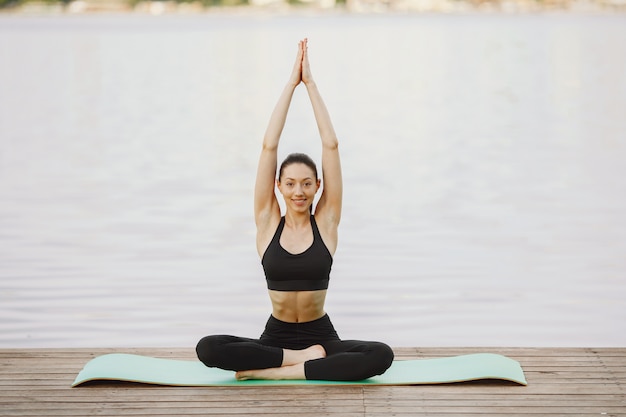
A yoga body isn’t just about being flexible; it can also boost your memory, heart, and bone health, says Anna Magee.
Brits are now spending around £790 million annually on yoga, embracing its many forms—from traditional poses to unique hybrids like dog yoga and paddleboard yoga. While some variations might seem odd, science is backing up the real benefits of yoga more and more.
Research from UCLA found that a three-month course of yoga and meditation was more effective at minimizing age-related brain impairment than traditional memory exercises. Another study showed that yoga could improve sleep quality in breast cancer survivors.
Lucy Edge, 53, once an advertising executive, turned to yoga during a period of deep depression instead of taking prescribed anti-depressants. She traveled to India for six months to learn yoga, which left her happier and more content, a feeling she hadn’t experienced before. Lucy has since written three books on yoga and founded Yoga Meds, a section on her website Yogaclicks.com that lists over 300 clinical trials highlighting yoga’s benefits for various conditions.
Here are a few ways yoga can improve your health and tips for getting started (no need for fancy gear):
If you’ve relied on crossword puzzles and Sudoku to keep your memory sharp, it might be time to try the warrior pose. The UCLA study, which compared brain scans and memory tests on adults over 55, found that those who did 12 weeks of yoga and meditation had better spatial and visual memory improvements, reduced depression and anxiety, and increased resilience to stress.
The participants did one hour of Kundalini yoga per week—a gentle form that includes breathing exercises, meditation, and chanting mantras. They also did 20 minutes of Kirtan Kriya daily, involving chanting, hand movements, and light visualization.
Walking or jogging is often recommended for heart health, but yoga can be just as effective. A 2014 review in the European Journal of Preventative Cardiology found that yoga might reduce heart disease risk as much as conventional exercises like brisk walking. Stress contributes to heart disease, and yoga, by reducing stress hormones, helps lower blood pressure and heart rate, decreasing blood clot risks.
Charlotte Watts, a yoga teacher and author, has created a series of stress-reducing yoga poses perfect for beginners. Anna Ashby from Triyoga Studios recommends Restorative yoga, where poses are supported by bolsters and cushions and held for up to 12 minutes, helping to reduce stress quickly.
Sarah Shone, a physiotherapist and yoga teacher, developed yoga classes for back pain in a Primary Care Trust rehabilitation program, where 87% reported pain reduction. The National Institute of Clinical Excellence (NICE) recommends yoga for lower back pain, and Shone aims to train more physiotherapists to incorporate yoga into their work.
Yoga also helps prevent incontinence by targeting pelvic floor muscles and can increase bone density since it’s weight-bearing. It’s adaptable to various health conditions, making it accessible for everyone.
If you’re new to yoga, tell your instructor about any health issues and start with gentle styles like Hatha or Iyengar. If you have a specific condition like back pain, consult your doctor about possible subsidized yoga classes through the exercise referral scheme.
Choosing the right yoga mat can enhance your practice. Consider where you’ll store it, whether you need to carry it frequently, your height, and the mat’s thickness for joint protection. Thicker mats offer more cushioning, which is crucial for comfort during practice.
If you’re looking for a good mat, Healthista recommends the Elephant Cork Yoga Mat from Valka Yoga, priced at £69.95. It’s eco-friendly, versatile, and made from renewable materials. It includes a carry strap and comes with a 15-day money-back guarantee and a one-year replacement warranty. Cork mats are great for grip, especially when wet, and are antimicrobial and odor-resistant.
A matching cork yoga block from Valka Yoga, priced at £19.95, is useful for added stability and grip during poses. Although heavier than foam blocks, cork blocks are beneficial for more challenging positions.
Not flexible? No worries. Yoga suits everyone, regardless of flexibility. Here are some class options:
– Yin or Restorative yoga, typically under candlelight with support props, is perfect for deep relaxation.
– Vinyasa Flow connects poses with breath in a dynamic sequence, suitable for all levels.
– Iyengar yoga focuses on alignment and uses props to assist with poses, holding each for up to 20 breaths.
– Anusara yoga combines alignment with flowing movements to upbeat music, originating from LA.
– Yoga Therapy involves specially trained teachers using yoga to aid in recovery from injuries or illnesses.
Lucy Edge’s latest book, “Down Dog Billionaire,” is available on Amazon.